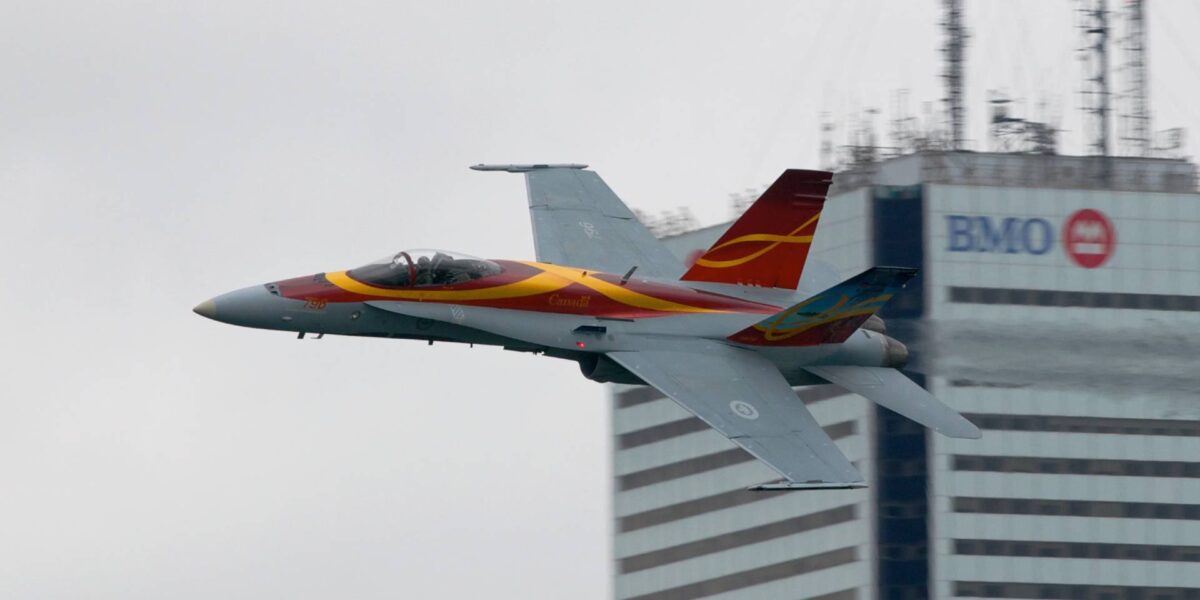For 74 years Canada’s military, government and civilian aircraft have been put on display in the skies above Toronto’s downtown. The Canadian International Air Show (CIAS) is now a part of the annual Canadian National Exhibition (CNE).
What is a longstanding tradition for some, has become an annual torture for others. A 2016 column in the Toronto Star noted that the air show could be traumatic for the diverse community that makes up the city’s downtown, which includes many migrants, some of whom have escaped active warzones.
Others living in the area live with sensory issues that are aggravated by the noise and who feel that their community is not consulted about this loud event that happens in their backyards every year.
A frightening and painful experience
Local composer Benjamin Hackman of The Holy Gasp, lives in the Kensington Market area and as an adult, was diagnosed with autism.
Hackman remembers how throughout his life bright lights and loud noises caused him active discomfort and that as a result has always dreaded the air show.
“I hate the airshow. It has frightened me since day one,” he said in an interview with rabble.ca.
Hackman said that this past year’s air show was so painful for him that he went to his doctor to see if he had punctured an eardrum.
“As a composer, threats to my ears of this magnitude are threats to my livelihood. I feel hopelessly trapped. Noise cancelling headphones don’t block out the sound. They mitigate it to some extent, but I can’t turn the sound off,” he said.
Popular in the GTA, but not so much in downtown
Hackman said that he felt that the air show, while popular with those living in the area surrounding the city, was less so for the people who could not escape it in their neighbourhood year after year.
“It’s a socially alienating experience to have airplanes in my neighbourhood being flown by people who don’t live in my neighbourhood and being enjoyed by people who don’t live in my neighbourhood. It is an imposition,” he said.
Hackman said that he has heard very few compelling reason as to why the air show should continue. He said that he heard one reason, that it was a display of Canada’s military might, but felt that now, especially in a time of rising conflict around the world, that there were better things for Canada to exhibit.
“It could be a really nice gesture to say, ‘So much so do we oppose war that we aren’t fruitlessly flying our airplanes and showing our capabilities for violence, but instead showcasing people planting community gardens, and feeding the homeless and providing safe injection sites and performing acts of compassion for each other,’” he said.
Militarism is bad for the planet
Militarism of the kind displayed at the Canadian International Air Show is bad for the planet in a range of different ways.
Mark Leith of Seniors for Climate Action Now (SCAN) are lobbying Toronto City Council in opposition to the air show on the grounds both that it promotes militarism and because of the carbon emissions it creates that pollutes the atmosphere.
READ MORE: Seniors’ climate action group fights to save the planet for the next generation
Major weapons manufacturers like Lockheed Martin have been sponsors of the air show.
“It’s a sales show,” said Leith. “They use it for marketing to sell their jets.”
On top of promoting weapons of war, these planes also put out large amounts of CO2 into the atmosphere.
According to research by the University of Durham in the UK, every time a modern jet fighter flies 185km, it emits as much CO2 as the average car does in a year.
“It’s a very wrong message, in terms of trying to deal with the climate emergency, to have these highly polluting planes flying for our entertainment,” said Leith.
Groups like SCAN and individuals like Benjamin Hackman are calling for an end to events like the Canada International Air Show both for the well-being of individuals and for the planet.
“I’d like to think that the canceling of the air show will make the world a little bit more of a safer, more sane place,” said Leith.



